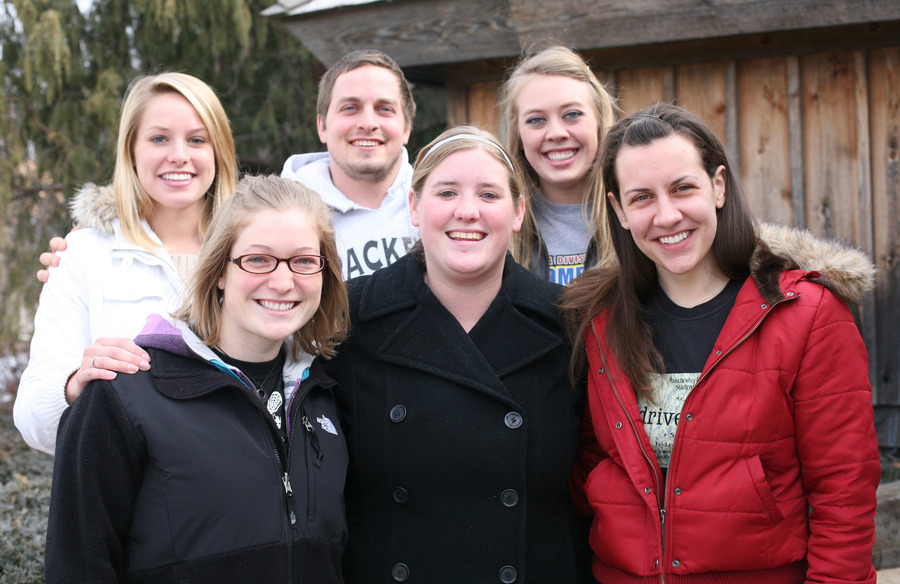

For many years, education majors at Gustavus Adolphus College have been learning on the job through student teaching experiences in Minnesota public school districts such as Shakopee, New Prague, Le Sueur, and Eden Prairie just to name a few. While Gustavus still relies heavily on local school districts for student teaching placements, today’s Gustavus education majors have the opportunity to carry out a portion of their student teaching in unique locations such as Spain and Alaska.
This past fall, five Gustavus students completed a session of their student teaching at the International School at Sotogrande, located on the southeast coast of Spain. The curriculum and instruction used at the school is under the direction of the International Baccalaureate Organization and is based upon project-oriented curriculum and facilitative instruction.
Rachel Click, Riley Hoffman, Dawn Lewis, Brittany Oslund, and Annika Torkelson were the five Gustavus students who participated in the inaugural Sotogrande-Gustavus teaching partnership. At least two of the students have been offered jobs at the school when they graduate and receive their teaching certification.
“Student teaching in Sotogrande was an amazing part of my experience at Gustavus,” Click said. “Teaching abroad opened my eyes to a wider perspective of education in general. I was able to work with staff and students from all over the world and follow a teaching curriculum and standards different from public education in the U.S. From my experience I learned more about international education, more about myself as a teacher, and more about myself as a person.”
The program is under the direction of Debra Sandquist, Gustavus’s coordinator of teacher admissions and field experiences. Sandquist is in her second stint as an employee at Gustavus, after she spent 10 years working for the St. Louis Park School District, where she successfully initiated the Primary Years International Baccalaureate program there.
Sandquist has spent a great deal of time scouting possible sites that would enrich a Gustavus student’s student teaching experience.
“When I’m looking for a possible site, I’m looking for a number of things,” Sandquist said. “I’m looking for somewhere that will provide an indigenous culture, somewhere with elements of social justice to align with the College’s values and mission, and a location where the students will have an opportunity to engage in a second language learning experience.”
One unique aspect of the program is that the students involved all live together in one house to create a professional learning community, and therefore have a much more shared and reflective experience. The program also features opportunities for faculty members from the proposed site to visit Gustavus and work with the education department methodology courses, through a faculty exchange. Sandquist is looking to get other departments and local school district administrators and teachers involved. She envisions the program to become a true collaboration in every sense of the word.
Dr. John Clementson, chair of the education department at the College, has encouraged this model of student teaching for several reasons.
“This model gives education majors an opportunity to study abroad or in a culturally-rich domestic placement,” Clementson said. “The model developed by Deb Sandquist’s vision has also provided the department with an opportunity to host faculty from other cultures. In a flattened world, we want to provide pre-service educators with global perspectives that they can share with their future students. We are excited about the many opportunities this model will provide for our students, our faculty, and for area administrators and teachers.”
This spring, six Gustavus students will be part of a similar experience in Barrow, the northern most point of Alaska. Along with their student teaching duties, the students will be immersed in the culture of the native Inupiaq Tribe, a tribe that relies heavily on hunting, fishing, and whaling in order to survive. The Barrow participants will also be afforded an opportunity to study global warming issues with Steve Hastings, a scientist from the Barrow Arctic Science Consortium.
The six students going to Barrow are Tony Bissen, Emily Bracken, Carol Cook, Rachael Driscoll, Jenny Koffski, and Samantha Madsen.
“I am thankful for the opportunity to teach in such a unique place,” Koffski said. “Working with the Inupiaq will be eye opening and inspiring. I look forward to learning their cultural values and traditions.”
Leave a Reply
You must be logged in to post a comment.